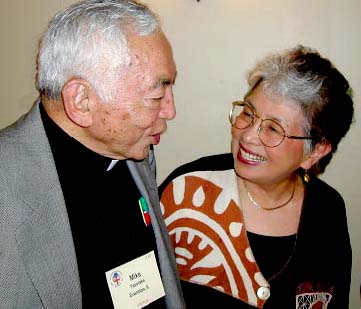
This is a web version of the ECUSA General Convention Daily. Anglicans Online has produced this web version, from the official PDF edition, for your reading convenience. Other days' issues are here.
Peace Award to Yasutake
BY SHARON SHERIDAN
 |
|
The Rev. Seiichi Michael Yasutake is pictured with his sister Mitsuye Yamada at the Episcopal Peace Fellowship awards dinner Monday where he was awarded the John Nevin Sayre Award "for courageous witness in the cause of peace and justice." photo/DICK SNYDER |
"My pacifism, anti-war and anti-militarism [beliefs] . . . derive from my experience with the Second World War, especially as [a] war between the land of my ancestry, Japan, and the country of my birth, the United States," Yasutake, 79, told the gathering.
Yasutake said he marveled at how God has taught him "the meaning of justice and peace in the midst of conflicts -especially conflicts between races and nations" especially as a non-white, whose country was, at one time, the enemy of this nation. "I believe . . . all of us are affected very personally by what's going on in the big wide world," he added.
Yasutake "raised hell appropriately" during the turbulent 1960s and 1970s, recounted the Rev. David Selzer, chair of EPF's National Executive Council. Since 1983, Yasutake has been executive director of the Interfaith Prisoners of Conscience Project, whose efforts helped secure the 1999 release of 11 Puerto Rican prisoners who had joined the struggle for Puerto Rico's independence.
In today's world, Yasutake said, "There's a rise in hope for self-determination and sovereignty." But conflicts also arise over related issues, such as the U.S. naval bombing in Puerto Rico, he said. Such conflict "in a way is necessary," he said. "If you're going to do anything good, you're going to have to confront oppression."
Started as the Episcopal Pacifist Fellowship to support World War II conscientious objectors, EPF was the "groundbreaker" for theEpiscopalChurch establishing a peace commission and has expanded to oppose all forms of violence, said John Michael Sophos, the Fellowship's newsletter editor. "It's holding up a standard for the church that there can be no peace without justice and remindingthechurch of ourbaptismalvows, particularly the dignity of every human being."